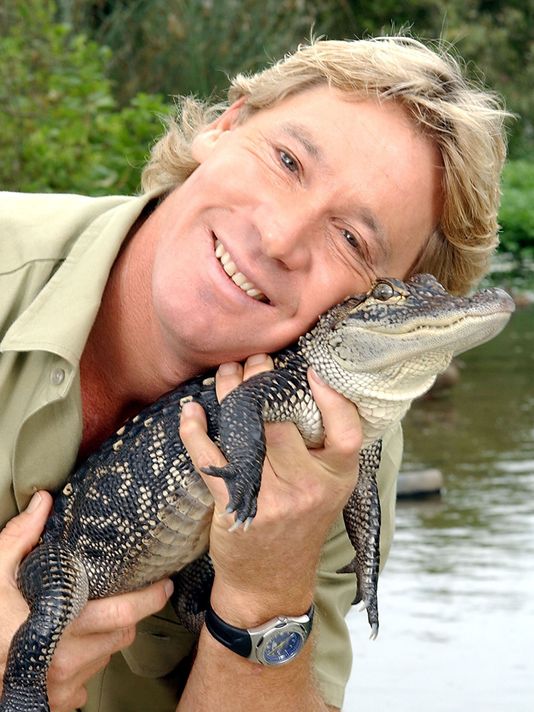In regards to ‘PETA comments on Steve Irwin’s treatment of animals’
Dear Editor,
Steve Irwin’s charisma cannot disguise the fact that he made his name by harassing wildlife. His death was genuinely sad, but while he was still alive, PETA did not shy away from criticizing his mistreatment of animals—such as invading their homes to provoke and disturb them and dragging frightened animals onto talk shows for publicity.
So when Google recently posted a “doodle“ glorifying Irwin’s systematic harassment of animals, PETA was compelled to speak out against the harmful message it sent. As the release of Leaving Neverland makes clear, death doesn’t magically absolve celebrities of wrongdoing—even those who were lauded during their lifetimes.
Irwin’s notorious television program showed him invading animals’ natural habitats and agitating, harassing, upsetting and disturbing them in the process. He also subjected animals to the stress of public appearances, including taking them on television talk shows—a loud, confusing and unsettling experience for animals who naturally shun human contact.
Although Irwin often spoke of the importance of animal and habitat conservation, his actions contradicted his words. By barging into animals‘ homes, grabbing and wrestling them (always against their will), and using them as props, he encouraged impressionable viewers, including children, to invade animals‘ space and to treat living beings as playthings.
Experts, including the world-renowned marine explorer Jean-Michel Cousteau, have agreed that his tactics were more disruptive than educational. After Irwin‘s death, Cousteau noted that Irwin would “interfere with nature, jump on animals, grab them, hold them, and have this very, very spectacular, dramatic way of presenting things. Of course, it goes very well on television. It sells, it appeals to a lot people, but I think it’s very misleading. You don’t touch nature, you just look at it.”
Others shared this view. In an op-ed published in The Guardian following Irwin‘s death, Australian writer and noted feminist Germaine Greer observed, “What Irwin never seemed to understand was that animals need space. The one lesson any conservationist must labour to drive home is that habitat loss is the principal cause of species loss. There was no habitat, no matter how fragile or finely balanced, that Irwin hesitated to barge into, trumpeting his wonder and amazement to the skies. There was not an animal he was not prepared to manhandle. Every creature he brandished at the camera was in distress.“
While Irwin built his career on agitating wildlife who were minding their own business, PETA exists to end speciesism and cruelty, to ensure that all living beings’ interests are given the consideration they deserve and to propel the conversation about animal rights forward. A single, 280-character tweet can’t possibly encapsulate all the intricacies of any issue, but we use every means available to ensure that animals’ rights are respected. This is a vital effort when the choices that people make—such as what they eat or how they choose to entertain ourselves—are a matter of life and death for countless animals.
PETA also provides hands-on help to desperate animals in impoverished communities surrounding our Sam Simon Center headquarters in Norfolk, Virginia. Last year alone, we helped more than 25,000 animals from more than 250 cities, and spent more than $2,300,000 on companion-animal services locally. Our fleet of mobile clinics has spayed and neutered more than 161,000 animals at no or low cost to their guardians since 2001, preventing countless more from being born, only to end up on the streets, in shelters, or neglected and unloved.
Every year, the majority of animals helped by PETA‘s local program are sterilized or provided with veterinary care before being returned to their guardians. PETA is proud to offer end-of-life services, free of charge, for sick and dying animals whose guardians can’t afford to pay for euthanasia at a veterinary clinic. We offer a peaceful end to suffering for animals who are elderly, feral, sick, dying, aggressive, or otherwise unadoptable. When adoptable animals come our way, we find them excellent homes or transfer them to high-traffic shelters for a chance at adoption.
Just as true conservationists respect animals by giving them their space and privacy, true animal advocates roll up their sleeves and do what’s needed to prevent and end needless suffering. PETA is proud to use every means available and work on every front to bring us closer to a day when all animals are treated with the respect, compassion and dignity they deserve.
Kind regards,
Colleen O’Brien
Colleen O’Brien is vice president of communications for People for the Ethical Treatment of Animals (PETA), 501 Front St., Norfolk, VA 23510; www.PETA.org.
photo courtesy USA Today
























